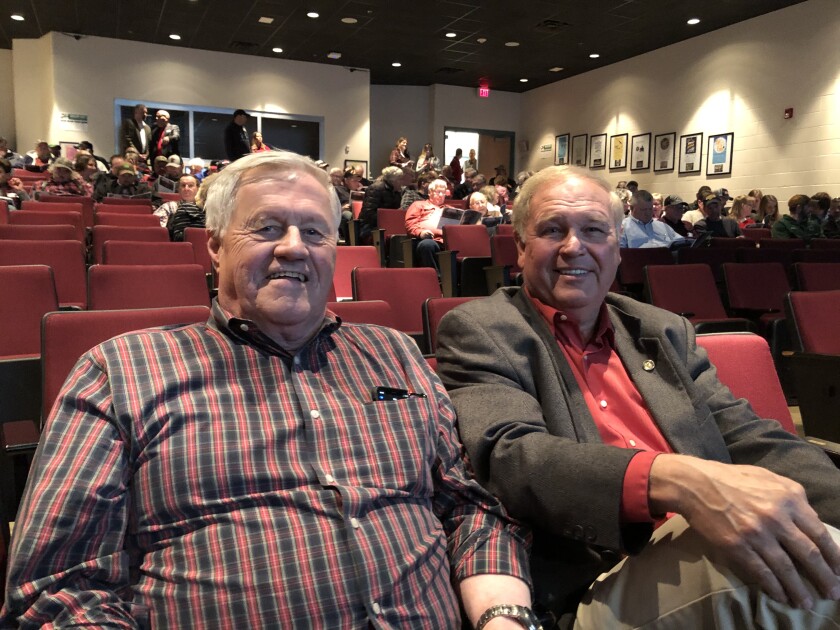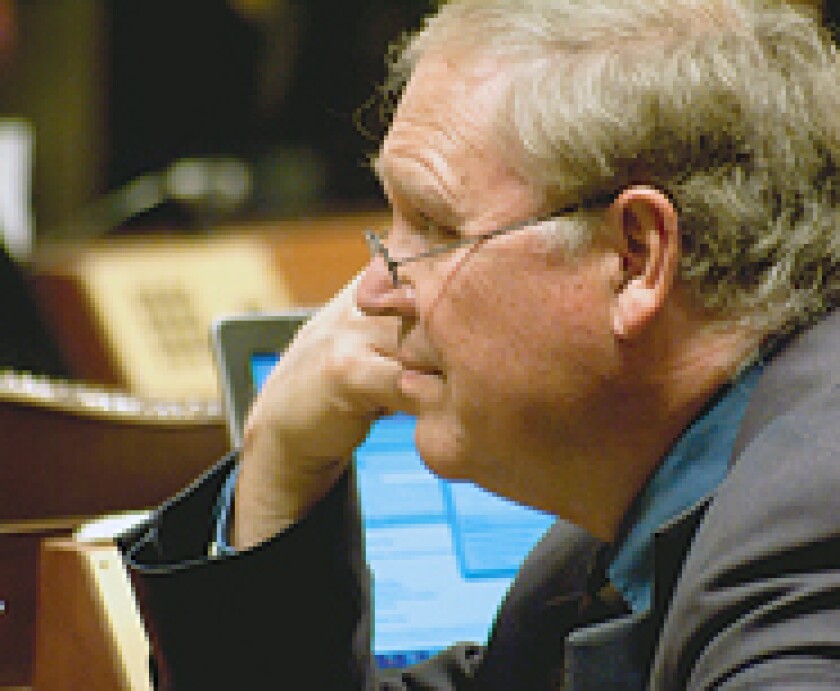ACTON TOWNSHIP — In his 22 years in the Minnesota House of Representatives,
R-Acton Township, has served as a leader who could reach across the aisle and get things done — not only for the people in his district, but for greater Minnesota.
Urdahl “made his mark” serving as a member of the Capital Investment Committee for 20 years. The committee decides which projects throughout Minnesota will receive financial assistance in the form of state bonding.
Urdahl credits persistence, working across the aisle and relationship building for his success in passing bonding bills that have impacted the quality of life for all Minnesotans.
“One of the most important parts of being successful in the Capitol is building relationships, building trust,” he said. “People believed that I was doing what I was doing because it was for the best. It was the best for the people that I wasn’t being political, I wasn’t being partisan.”
More than $14 billion in state bonding has been allocated to capital improvements during Urdahl’s time in the House. More than $12 billion was allocated while he served on the Capital Investment Committee, of which more than $6.6 billion was allocated while he served as the chair or minority lead of the committee. As chair, he secured bonding of more than $2.1 billion for projects.
“Those are infrastructure needs projects — covering across the whole state of Minnesota. I mean, I can go to almost any town in the state, and people know who I am because of this, because of a long association with infrastructure and projects,” Urdahl said. “A lot of them deal with water. … When the towns across the state for the last 20 years have been doing their water towers, the wastewater treatment plants, that’s coming from money that I helped get into that and because I made it a priority.”
Don Davis / Forum News Service file photo
Putting partisanship aside
Urdahl, who as a Republican was in the minority the majority of his time in the House, explained that being the minority lead on the Capital Investment Committee was more important than any other chairman in the Minnesota House of Representatives due to the need for a supermajority, or two-thirds, vote to pass a capital investment bonding bill.
“At present, that meant 11 Republicans. If they didn’t get 11 Republicans, they could not pass a capital investment general obligation bond bill, and so it was my task to help them find 11 Republican votes to pass the bill,” Urdahl said. “Now that gives me a great deal of power because I tell them, ‘OK, you have to have reasonable things in this bill.’”
In other words, the projects presented by the Democratic-Farmer-Labor Party couldn’t be “so outlandish” that he wouldn’t be able to find the votes amongst Republicans in the House, according to Urdahl, and he fought to include things Greater Minnesota and Republicans wanted.
“I developed good relationships with the Democrat leaders and capital investors, and I was successful in doing that,” Urdahl said.
He added that twice he went around House Republican leadership to get a bill passed that they opposed “because it was the right thing to do for the state of Minnesota and for districts we represent. I mean, they were asking Republicans to vote against their own districts, which I believe was wrong.”
Urdahl explained that in recent years, Republicans used the supermajority provision to leverage the bonding bill. In other words, they would not vote for the bonding bill unless the DFL gave them something else they wanted outside of the bonding bill.
“Leveraging outside of the bill didn’t work. It just leads to us doing the bills inconsistently,” Urdahl commented. “We’re supposed to be doing it in the second year of the biennium, but now we’re not.”
This year Urdahl said he had the Republican votes to pass a bonding bill, but it never made it to the House floor due to the leveraging around other political factors.
The House was able to pass a cash-only capital investment bill, which needs only a simple majority to pass, and included $10 million for a much needed project for First District Association and the
Unfortunately, it missed a vote in the Minnesota Senate by 15 seconds.
First District serves 650 family farm owners in 46 counties in Minnesota, marketing 8.4 million pounds of milk per day and processing 7.5 million pounds per day, according to an October 2023 Capital Investment Committee presentation given by Bob Huffman, First District president and CEO.

Carolyn Lange / West Central Tribune file photo
After undergoing a $200 million expansion, First District has been in chronic violation of industrial discharge limits for phosphorus and nitrogen. The nearly $57 million project would separate the business’ wastewater line from the city’s main line and construct a pretreatment and renewable energy facility.
“If this were all to fall apart, then First District would have to cut their production by about half. And when you have a state that already is short in terms of their processing, that is a serious, serious problem,” Urdahl said, noting that farmers would struggle to find somewhere to process their milk. “ … It’ll get taken care of eventually. It’s a big enough deal and I’ve raised the point enough with them, that, as (Gov. Tim Walz) said, ‘Everyone in state government knows about First District in Litchfield.’”
In the meantime, an agreement has been reached to allow First District Association to keep functioning at its latest capacity without being fined by the the city of Litchfield for industrial discharge violations.
Fighting for his district
Urdahl’s own constituents definitely benefited from his 22 years of service through the projects funded by bonding bills and other legislation he helped pass.
For instance, the restoration of the Litchfield Opera House was a beneficiary of small amounts of money several times throughout his tenure.
“The Litchfield Opera House … I didn’t try to get big amounts of money, but it’d be $50,000 here, $100,000 there, over five, six years,” Urdahl said. “They would joke about that. But you know, one of the things I tried to do was to restore old buildings, the Capitol being one, the (Grand Army of the Republic) Hall in Litchfield, the Opera House, those types of things.”
He has also garnered money to restore the building facades of historic downtown Litchfield, to assist in funding the new Litchfield Wellness Center that is currently being built and to finish the floor of the Dassel-Cokato Recreation Center.
Larger infrastructure projects Urdahl championed were the
and making
Minnesota Highway 23 four lanes
across Minnesota.
Urdahl could be a little sneaky at times. He giggled a bit when telling how he was able to get a state park designated in Meeker County for a short period of time. The state park is now Greenleaf State Recreation Area.
“In statute, it was put in as a state park, but I kind of snuck it in there at midnight before adjournment,” Urdahl explained. “Once the DNR and the governor figured out what I had done, they didn’t want that state park there, they wanted Vermilion.”
Lake Vermilion State Park in northeastern Minnesota was established in 2010, and in 2014 was officially joined with the adjacent Soudan Underground Mine State Park.

Tom Cherveny / West Central Tribune file photo
After some finagling, an agreement was reached that Greenleaf would be a state recreation area and the state would provide some funding to make improvements and it opened a few years ago.
Upon speaking with Urdahl for any amount of time, it is clear that he is a storyteller and it impacted his ability to get funding for projects in his district — one of which benefited the whole
Cosmos was having problem after problem, according to Urdahl. Arsenic had been found in its water and the state was mandating a new water tower be built, but Cosmos did not want to pay for it.
While dealing with that issue, the library burned down and mold was found throughout its senior center and it had to close. Once the new water tower was built and the water turned on, the city’s water main broke in 18 places under Minnesota Highway 4.
“When I gave this presentation to the committee … I gave a Kleenex to each of the members ‘in case you have to cry when you hear the story of the Job of cities,’ and the bill passed,” Urdahl said, recalling how he compared Cosmos to Job of the Bible. “Out of that, they got a water tower, they got Highway 4 redone through town and all the pipes underneath the highway replaced, they got a little community center with the library and a senior center. So we helped Cosmos.”
State Capitol restoration
When Urdahl was first elected, he was shocked to find the deterioration that had taken place at the Minnesota State Capitol as he remembered driving by the Capitol as a child, looking at the beautiful building all lit up.
He considers the more than $300 million restoration of the Capitol as one his greatest accomplishments while serving as a representative.

Don Davis / Forum News Service file photo
“To get elected and be in there realizing, my gosh, it’s a beautiful building, but it’s starting to fall apart. There are cracks in the ceilings. The paintings are being damaged. There are blocks of marble falling off the exterior. Something has to be done,” Urdahl said, recalling what he thought when he started working at the Capitol.
He noted that people had tried for years to move the restoration forward and there were various plans over more than a decade, but nothing could be done due to the Senate not wanting to give up the office space it had taken up at the Capitol.
Finally deciding the arguing had to end, Urdahl met with Senate leaders and others as he chaired the Legacy Funding Finance Committee, forming a Capitol Preservation Commission.
“It took a little bit of time, but once I got going on it, within a couple of sessions, we passed a bill to begin the financing of the reconstruction,” he said. “I think it’s certainly one of the most important projects I managed to get through.”
Along with the restoration of the Capitol, a $90 million Minnesota Senate Building was also constructed to house the Senate offices.

